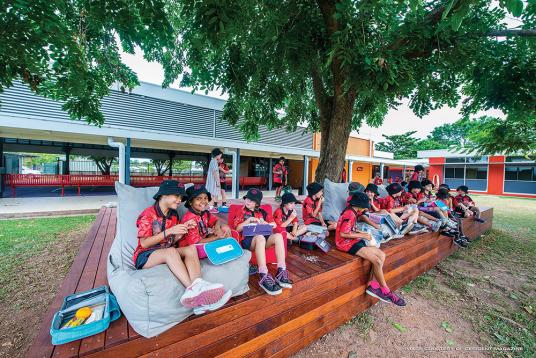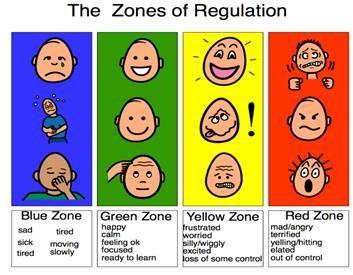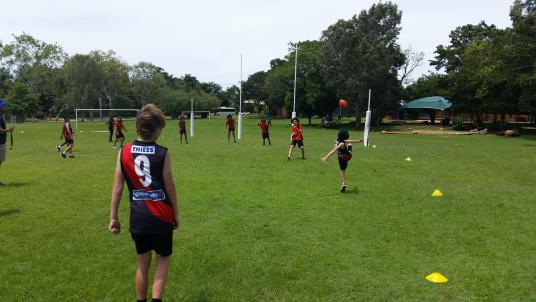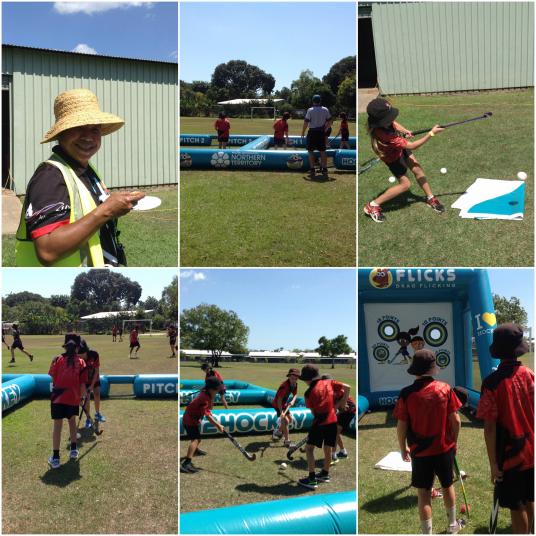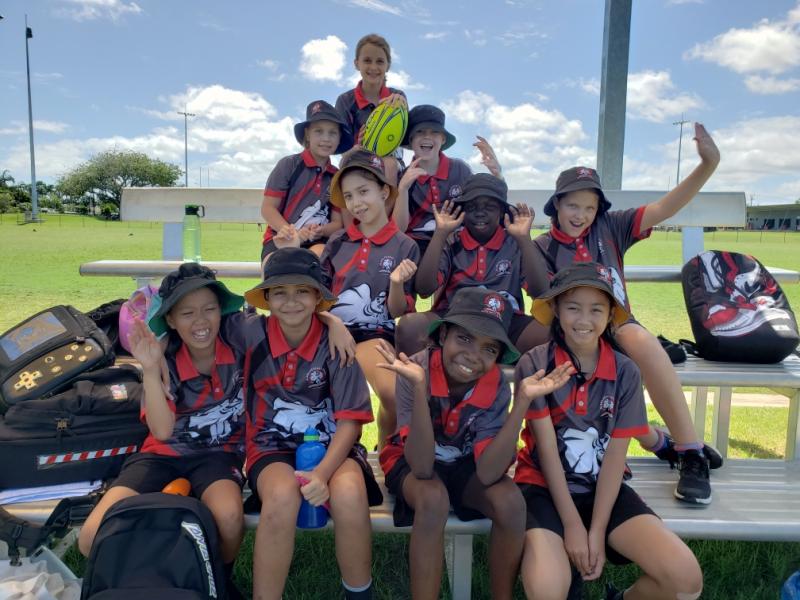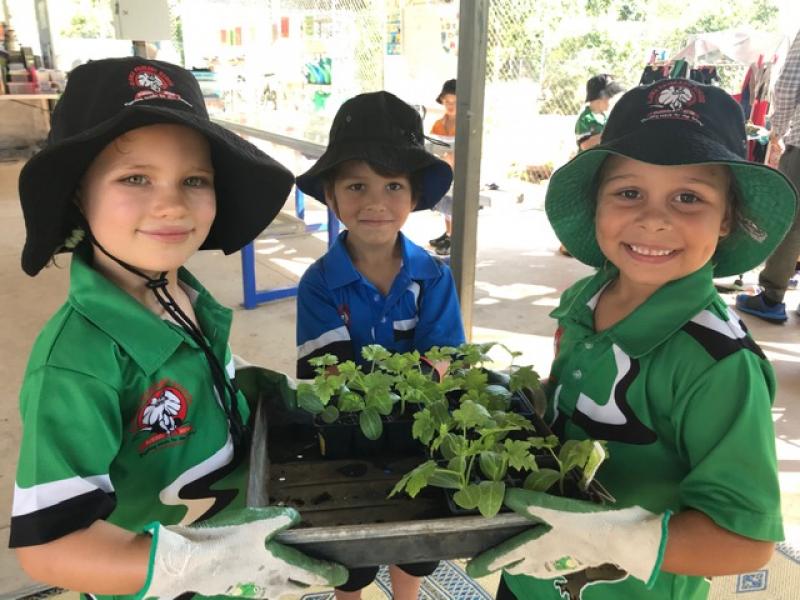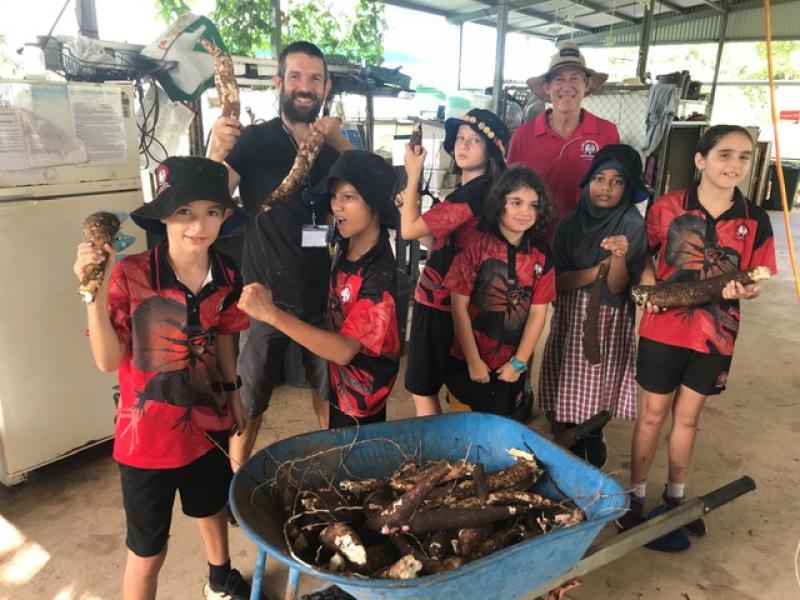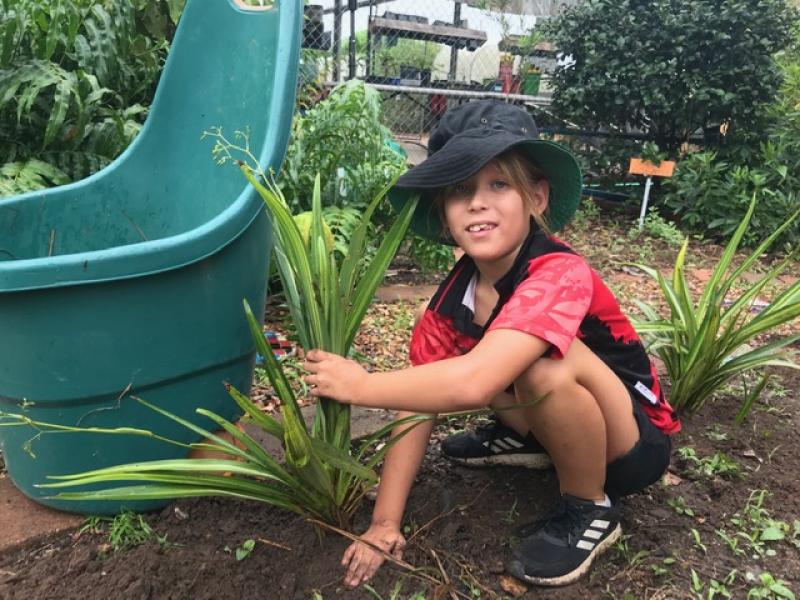The farm and kitchen program provides hands-on, real life experiences for our students. Science, Health and Arts are integrated curriculum areas that are taught at the farm.
- Background
The farm was initially set up in 2004 by Danial Kelly, the first farm teacher and Sharon Reeves, the Principal, leading the school community to solve problems and situations as they went along. The farm has been a major focus for the community involving parents, students and teachers. In 2005, Marg Ross became the Farm teacher and continued to teach about the animals, their needs and specialised care, environmental education, design, technology and construction. In 2006 a major focus was on the Sustainable Schools Project and this influenced the program in semester one 2006. Students were encouraged to use lateral thinking to problem solve.
Today the farm has a huge variety of tropical and subtropical edible plants along with many hobby farm animals including chickens, quails, rabbits and goats. The students work in small groups to learn the skills of growing and harvesting along with caring for animals. Incorporated into their learning is the development of other useful skills such as problem solving, design, construction and team work. There is a big emphasis on the school values of respect, pride and personal best, while working cooperatively to help the farm thrive. Science, Indonesian Language and Inquiry are also part of the farm curriculum.
- Alawa Kitchen Garden Program
In 2008 we applied to be the NT demonstration school, for the Stephanie Alexander Kitchen Garden Program and were granted the initial funding to set up our program. Our kitchen was installed in July 2009. A herb garden was established outside of the kitchen to support this program. In Term 3 of 2009 we commenced Kitchen and Garden Lessons which continue for students Years 3-6 weekly. In 2013, with new staff in the garden and a chef in the kitchen, the garden was revitalised and stronger links with the Science curriculum and Café established. All classes were now attending a farm garden lesson each week. The mature fruit tree orchard provided plenty of fresh produce and an established chicken flock, a consistent egg supply. A strong focus on links with community helped to bring in new volunteers and create connections with Nemarluk Special School. Since then we have had a partnership with the US Marines(volunteer support), working bees with school families, SEDA student volunteers, links with local small businesses and our local member. In 2017 we became a Bunnings supported school to help reduce costs and bring in more expertise with construction projects on the farm. Produce from the farm garden is harvested for the kitchen classes, the school Café and any extra produce sold to our school community.
In recent years major focus areas have emerged with successful applications for grants to establish the aquaponics project in 2016.
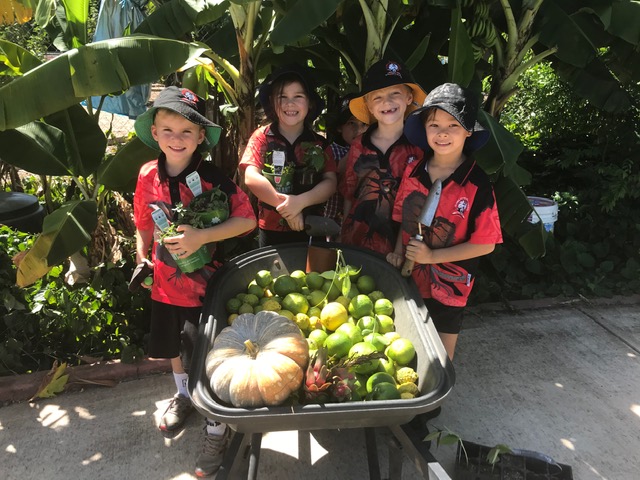
- The philosophy of the program
“The aim of the Kitchen Garden Program is pleasurable food education for young children. The underlying belief is that by introducing this holistic approach we have a chance to positively influence children’s food choices in ways that have not been tried before.” ”A kitchen garden is created to provide edible, aromatic and beautiful resources for a kitchen. The creation and care of a kitchen garden teaches children about the natural world, about its beauty and how to care for it, how best to use the resources we have, and an appreciation for how easy it is to bring joy and wellbeing into one’s life through growing, harvesting, preparing and sharing fresh, seasonal produce.”
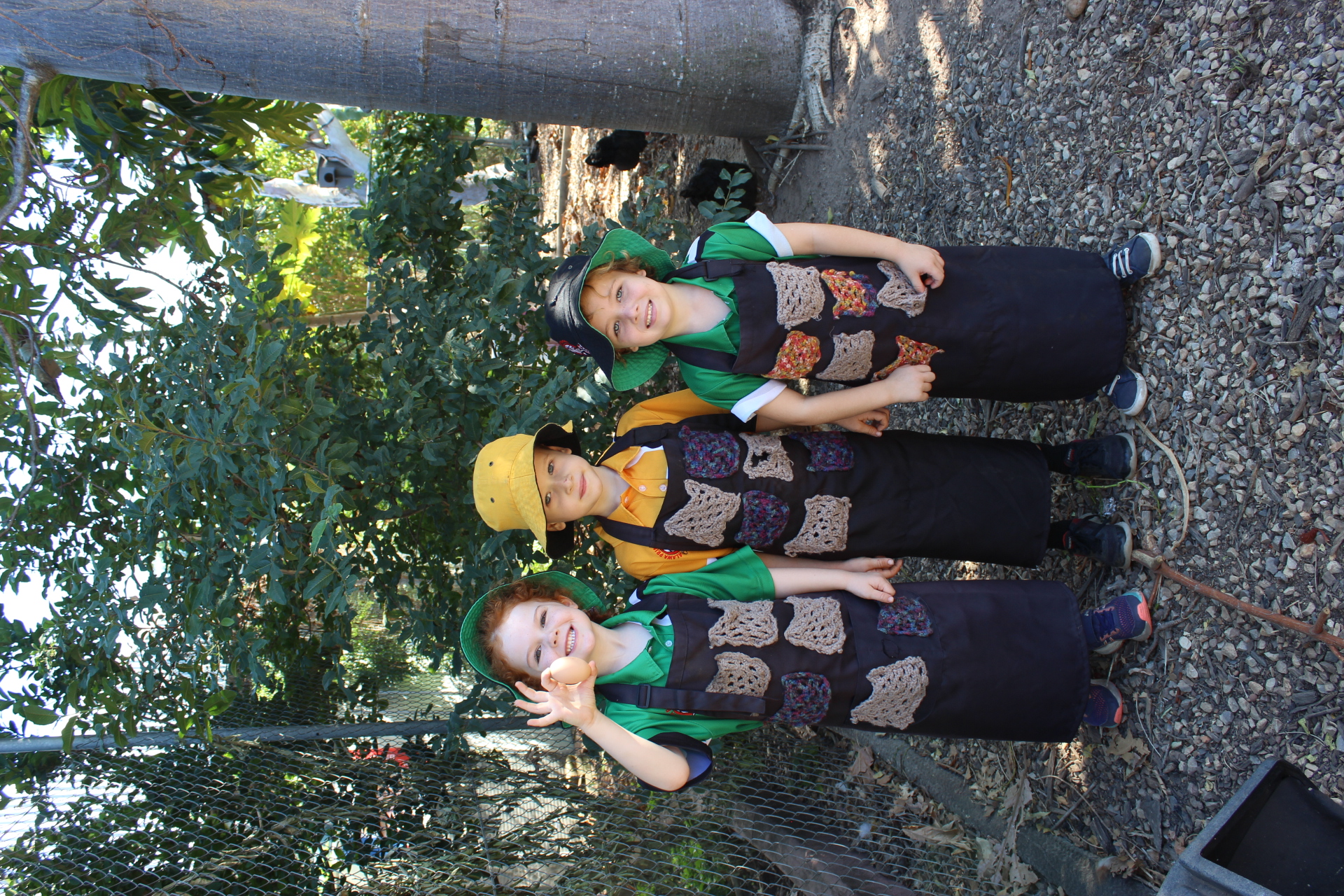
- How the program operates
All classes have an hour garden lesson in the farm each week. Children in years 3-6 have a 2 hour kitchen lesson every week for one semester. We have excellent multi-skilled staff involved. Our garden specialist teacher has the students intrigued and busy within our fantastic tropical garden. Our kitchen specialist works with a kitchen assistant to set up the kitchen with stores and equipment and create delicious seasonal recipes to go into interesting and creative menus for the students to cook every lesson.
Farm classes begin with a short discussion on specific topics. Subjects have included:
- Seeds, what they are and how to sow them
- Harvesting-how do we know when produce is ready to be harvested, how do we pick/collect it and what is needed to be harvested for the kitchen and Café
- Composting-how and why we compost in the garden
These talks give students theoretical knowledge of plants and their needs, benefits and uses etc. The class is divided into three groups, depending on the number of helpers in the garden. Each group works with either the garden specialist teacher, Farm Manager, parent volunteer or class assistant. The groups always do some animal care, gardening, science or art/craft based activity and for years 1-2, an Indonesian activity. Garden activities follow the Stephanie Alexander resources where applicable and whatever needs to be done in the farm at that time, such as mulching, weeding, planting out, planting seeds, fertilizing, harvesting etc. The children enjoy being outside and many are happy to do physical work. They especially like to watch plants that they have put in mature and fruit. They all enjoy harvesting and like to sample the produce whilst they work, e.g. rosella leaves and sweet leaf. It is our hope that they will have a better understanding of where their food comes from and feel confident to produce their own at home in the future. Happily, many children are already keen to take home cuttings and seeds to grow.
Our animal numbers have increased over the past 3 years to include goats, chickens, quails, ducks, finches, lizards, guinea pigs and rabbits. We have also had calves and turtles over this time. The students are responsible for the ongoing care and feeding of all of the animals. This is a very popular aspect of our program.
Some special projects in the garden have included the set-up of a working aquaponics system with freshwater fish education and harvesting, recycling of school waste and establishing a native bush tucker garden.
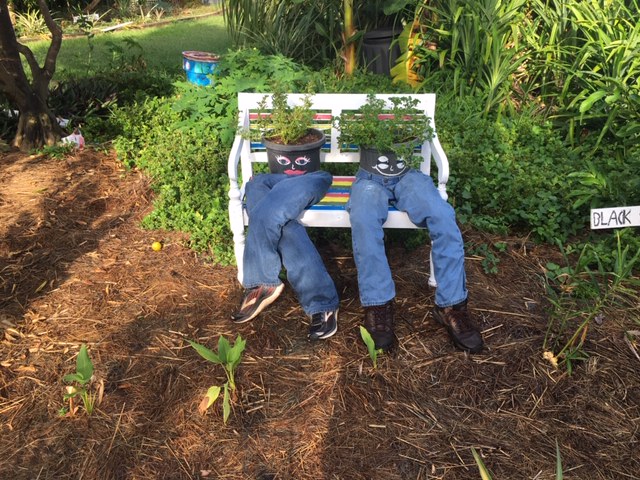
- Lessons in the kitchen
Student work together in small groups with a designated role that changes weekly. These roles are chef, collector, cutter, cook and cleaner.
After an introduction to the meal type or skill to be learnt, the groups are shown the table of seasonal farm produce and other ingredients they can use The pantry is stocked with sauces, herbs and spices and other staple produce available to use in their cooking. In their groups they are either given a set recipe, choose a recipe or do a ‘freestyle’ cook in which they create their own recipe.
The meals are cooked, areas cleaned and the table set ready to share the meal they prepared. At the end of the lesson, the groups review the meal discussing what they liked and what they would improve on.
On a regular basis, the groups are given a challenge using mystery ingredients to invent an exciting meal. A guest judge often presents an award to the best presented and most delicious meal.
Kitchen points are given for groups working collaboratively, cleaning up quickly and demonstrating excellent cooking skills.
Kitchen is a fun and dynamic class with an emphasis on group work, enjoying fresh seasonal farm produce and cooking interesting and delicious meals.

- Menus and Recipes
These are very much based on what is in season and growing in our garden. If ingredients have to come from elsewhere it is always chosen because it could potentially be grown in our garden, or locally (with the exception of onions and garlic). Some recipes are repeated with varying ingredients and some ingredients are used again and again in a variety of recipes. By using the same ingredients in a variety of interesting and delicious ways, it is hoped those involved will be able to come up with many imaginative ways of cooking our local produce, based on ideas given to them at school. By repeating recipes (sporadically throughout the term) it is hoped the techniques will be learned, so they can be replicated at home with a variety of available ingredients!!
Alawa Kitchen Recipes 2017 - Click here
Alawa Kitchen Recipes 2018 - Click here
Alawa Kitchen Recipes 2019 - Click here
Alawa Kitchen Recipes 2020 - Click here
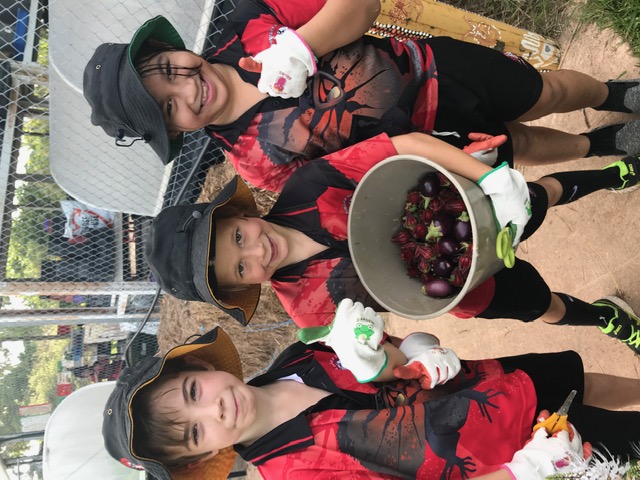
- 2023 International innovation grant
In 2022 we received funding through the Department of Education to celebrate Alawa’s diverse multicultural school community catering for 26 groups cultural groups, we grew, cooked and discovered produce from many countries. An Asian themed Zen Garden now provides not only herbs and other produce but a peaceful themed space where students can enjoy the water features and surrounds.
Kitchen Workshops were also funded for students and their families run by a qualified Dietitian. Students will be able to share recipes and cooking skills and learn the benefits of cooking fresh local produce.
The recipes cooked during the projects Kitchen Workshops have now been recorded and published into a multimedia digital cookbook containing not only the recipes but videos and information about the produce being used, its heritage and uses.
View Digital Cookbook here - Food Tour of the World Recipe Collection
- Rewards and Recognition
We have hosted the Stephanie Alexander training program several times at our school, for schools throughout the NT.
View more on the Kitchen Garden Foundation website
